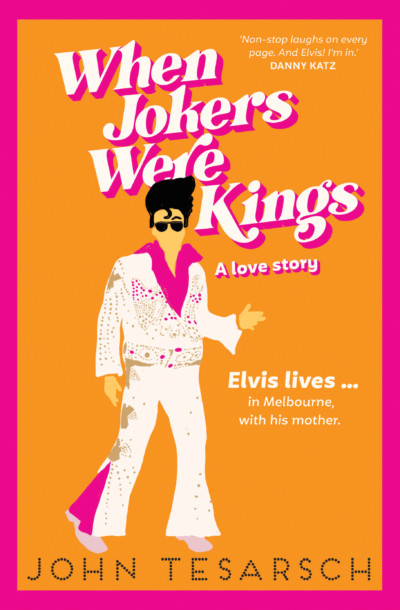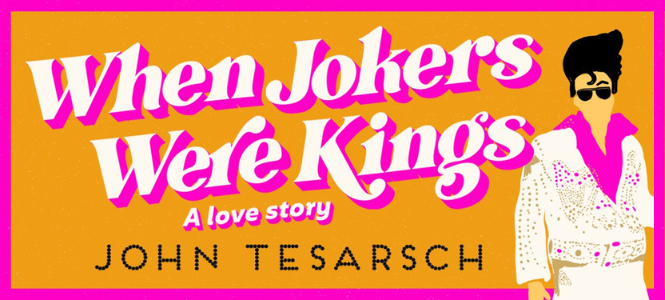John Tesarsch is the author of three acclaimed literary novels (The Philanthropist, The Last Will and Testament of Henry Hoffman, and Dinner with the Dissidents, which was shortlisted for the Colin Roderick Award). He has degrees in music and law, and pursued a career as a cellist in Vienna before he turned to writing. He is also a barrister, and he lectures in law at the University of Melbourne. When Jokers Were Kings is his fourth novel and first romantic comedy.
Today, John Tesarsch is here to take on our Ten Terrifying Questions! Read on …
1. To begin with, why don’t you tell us a little bit about yourself – where were you born? Raised? Schooled?
I was born and raised in Doncaster, then an outer suburb of Melbourne, on a quarter-acre block where there was once an apple orchard. There is still one surviving apple tree in the back garden. I went to the local primary school, then Carey Grammar, where I was handed a cello (more on that in answer to the next question).
2. What did you want to be when you were twelve, eighteen and thirty? And why?
When I was young, I wanted to be a musician. I was a cellist, and at the age of 19 I won a scholarship to study at the Vienna Conservatorium, as a guest of the city of Vienna.
I threw myself into my musical studies, but developed a rare allergy to cello rosin, which ended my career at the age of 22. Obviously, I was devastated, as I could barely even contemplate a life in which I wasn’t a musician.
I returned to Australia, completed a law degree and became a barrister. Then, at the age of 31, I was diagnosed with tongue cancer, requiring surgery and extensive treatment. For a while I couldn’t even talk. So I figured that I might have more luck as a writer!
3. What strongly held belief did you have at eighteen that you don’t have now?
This answer is related to the last. When I was 18, I could hardly imagine a life in which I wasn’t a musician. The road ahead appeared to be fairly straightforward. But life has a way! I had to reinvent myself, and now I take nothing for granted. You never know what is lurking just around the corner.
4. What are three works of art – this could be a book, painting, piece of music, film, etc – that influenced your development as a writer?
I’ll start with Crime and Punishment. It may not be Dostoyevsky’s greatest work (that title may be held by The Brothers Karamazov), but it was the first that I read and hence the most formative. I was 20 when a friend gave me a dog-eared copy. It was a window not just into another world, but into another human mind so different it was as though I were walking on the moon. As many readers will know, it’s about a miserable young law student who decides to murder an old moneylender with a hatchet, seeks to rationalise the crime, is caught, and then begins the path to redemption. Very bleak indeed. The vigour of the writing is remarkable: most other novels are anaemic in comparison.
I’ll follow this with Anne Tyler’s Dinner at the Homesick Restaurant. This is a portrait of a dysfunctional family, after the father abandons his wife, two sons and his daughter. Many years later, after I had finished writing my second novel, The Last Will and Testament of Henry Hoffman, I realised that my novel contained some form of unwitting symmetry. My novel was about a dysfunctional family with two daughters and one son, where it was the mother who left and the cold and distant father who stayed.
I’ll nominate Schubert’s Cello Quintet as my third work. Then again, all of Schubert’s chamber music is sublime.
5. Considering the many artistic forms out there, what appeals to you about writing a novel?
The limitless freedom that the form offers. Perhaps there are no two first paragraphs of any novels ever published that are identical. And with every extra word, every extra paragraph, the artistic choices multiply exponentially.
‘It’s a story about alienation and finding identity, a satire on capitalism, nationalism and celebrity.’
6. Please tell us about your latest book!
First, I can safely declare that it is entirely different from anything I have written before. It’s my first romantic comedy. (And let me add, before continuing, that there is nothing easy about writing comedy!)
When Jokers Were Kings is a love story between two downtrodden bank employees: Bertie, a mail clerk who moonlights as an Elvis impersonator, and Jasmine, who moonlights as a Michael Jackson impersonator. Together, they go on a tour of country Victoria and get caught in the crosshairs of a Ned Kelly impersonator, angry at the Americanisation of Australia. I’d like to think of it as The Rosie Project meets Candide – a quirky and philosophical romantic comedy that will keep readers enthralled from beginning to end.
7. What do you hope people take away with them after reading your work?
Although it’s a rollicking and uplifting tale, there’s lots bubbling away under the surface. It’s a story about alienation and finding identity, a satire on capitalism, nationalism and celebrity.
8. Who do you most admire in the writing world and why?
I will nominate another old Russian: Alexander Solzhenitsyn. On any analysis, the publication of his novella One Day in the Life of Ivan Denisovich, in 1962, was an historic event. It was the first published work to bring to light the horrors of Stalinism, with a subject so controversial that it could only be published with the approval of Khrushchev himself. Soon afterwards, the Politburo decided that this had been a mistake. Solzhenitsyn himself had already spent many years in the gulags and had survived cancer and internal exile, and now this book earned him another decade of persecution. But his courage was remarkable, and his work undoubtedly contributed to the demise of the communist regime. He was the writer as hero. (And his influence on me has been profound, as he was the inspiration for my third novel, Dinner with the Dissidents – but that’s another story.)
9. Many artists set themselves very ambitious goals. What are yours?
I want my novels to move readers, to provoke introspection and empathy, to enable them to view a familiar world through a different aperture. Other than that, I try to have only artistic goals. For instance, devising a new and effective metaphor brings me real delight. Just think of it: a metaphor combining two ideas that may never have been connected before.
10. Do you have any advice for aspiring writers?
Read widely. And read like a writer: try to understand the scaffolding behind the work.
Further, be persistent. Don’t give up. It’s the writer’s lot to suffer setbacks. And then, one day, something wonderful happens!
Thank you for playing!
—When Jokers Were Kings by John Tesarsch (Affirm Press) is out now.

When Jokers Were Kings
When mild-mannered mail clerk Bertie Jones tries his luck as an Elvis Presley impersonator, his whole world gets shaken up.
His doting mother doesn’t approve, for a start. But with his best friend as his overzealous manager and a budding romance with Jasmine, a Michael Jackson tribute artist, Bertie just might be about to hip-shake his way to the most unlikely stardom. Take a front-row seat to a tour de force of a musical and personal journey...







 Bestsellers: Emma Carey continues to perform, Johnny Ruffo and Jane Harper turn heads of readers!
Bestsellers: Emma Carey continues to perform, Johnny Ruffo and Jane Harper turn heads of readers!  Bestsellers: RecipeTin Eats and The 156-Storey Treehouse score highly with readers!
Bestsellers: RecipeTin Eats and The 156-Storey Treehouse score highly with readers!  Read an extract from Make You Happen by Jordanna Levin!
Read an extract from Make You Happen by Jordanna Levin!
Comments
No comments